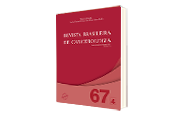Conciliação Medicamentosa em Cuidados Paliativos Oncológicos
DOI:
https://doi.org/10.32635/2176-9745.RBC.2021v67n4.1360Palavras-chave:
Reconciliação de Medicamentos, Cuidados Paliativos, Institutos de Câncer, Segurança do Paciente, BrasilResumo
Introdução: A ausência de informações a respeito dos medicamentos utilizados pelos pacientes pode causar erros de medicações. Assim, a comunicação entre profissionais de saúde, pacientes e familiares é primordial para a segurança do paciente nos diferentes níveis de atenção à saúde. Os farmacêuticos clínicos podem realizar a conciliação de medicamentos e atuar em colaboração com outros profissionais, objetivando otimizar a farmacoterapia e melhorar a segurança do paciente. As pessoas sob Cuidados Paliativos costumam fazer uso de polifarmácia e, quando não acompanhadas pelos profissionais de saúde, estão susceptíveis a potenciais discrepâncias não intencionais causadas por comunicação inadequada. Objetivo: Analisar o perfil das conciliações medicamentosas em pacientes que estão sob Cuidados Paliativos Oncológicos. Método: Estudo transversal, analítico e descritivo. Foram analisadas todas as visitas de conciliações realizadas na admissão dos pacientes, na unidade IV do Instituto Nacional de Câncer José Alencar Gomes da Silva (HCIV/INCA), no período de junho a novembro de 2018. Resultados: Realizaram-se 194 visitas, nas quais foram identificadas 1.770 discrepâncias (78,2%), sendo 93,8% intencionais, 0,7% intencionais documentadas e 5,4% não intencionais. Todas as prescrições apresentaram pelo menos uma discrepância e 34,6% foram totalmente modificadas pelo prescritor no ato da admissão. Foram realizadas 112 intervenções farmacêuticas relacionadas à conciliação medicamentosa. Conclusão: As principais discrepâncias encontradas, inclusão de medicamentos e ajustes de dose ressaltam a importância da presença de farmacêuticos clínicos no momento da admissão do paciente, em que foi possível ajustar a farmacoterapia, em conjunto com corpo clínico, contribuindo para a melhoria do perfil de prescrição.









